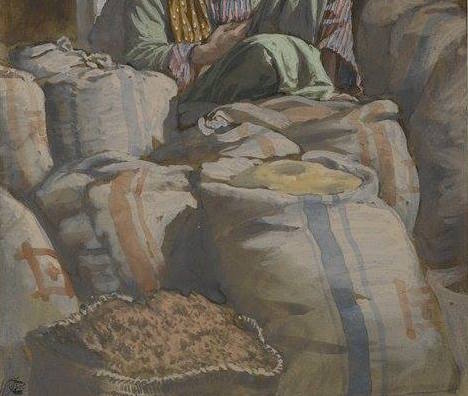by Leslie Scoopmire
In one of my favorite movies, Ferris Bueller’s Day Off, there’s a pivotal scene involving Ferris’s friend Cameron finally venting the anger he feels at his parents for never placing their priorities upon him, their only child. Cameron looks upon his father’s prized possession, a highly expensive classic sports car that his father has painstakingly restored, and suddenly begins to kick the incredibly expensive shiny chrome fender, lashing out as he never could against his actual father, screaming “Who do you love? Who do you love? You love a car!” And he kicks it over and over again, until finally, it ends up accidentally being propelled out of the garage in which it sits with the motor running, and is destroyed.
Who do you love?
This Sunday’s gospel reading confronts head-on the questions of power and privilege that loom so large over our social and political lives today. We need to be careful that we maintain the balance between security for ourselves and driving others to the brink of disaster. Perhaps we need to ponder the idea that my rights end where they begin to put others at real risk of harm.
Wealth and privilege can sometimes actually create more problems than solutions. Instea of sharing in their good fortune, the two brothers in this Sunday’s gospel end up fighting over the apportionment of it, and asking Jesus to mediate the dispute. Jesus ends up putting forth the same question Cameron asked, and although not in anger, the questions still apply to us today: What, really, are we striving for? Security? Vanity? Admiration?
Who do you love?
In our gospel for Sunday, one brother claims that the other brother is not sharing the inheritance left by their parents. The brother who is here wants Jesus to respond and mediate the dispute with his brother over the family inheritance. Here Jesus refuses to take sides, although he uses the opportunity to teach about the dangers of selfishness and greed.
The rich man sees the abundant produce as a problem, since he has no place big enough to store it. Now the question arises: why would he need to store it for such a long time that he is thinking about building new barns? It seems he has no intention of selling or sharing his abundance, but instead is going to store it for himself. This abundance is going to provide him with security to now relax, and “eat, drink, and be merry” –echoing the more famous, fuller phrase from Isaiah 22:13, which added the happy phrase “…for tomorrow we die.”
There is a parallel to the storehouses used in Egypt to store grain against time of famine in the story of Joseph in Genesis chapter 41. Yet the rich man in our story from Luke is not storing his grain up for the good of others, but so that he can demand top dollar later on when others are in want. His surplus only becomes valuable later on if others end up with not enough to feed themselves. The rich man will be perfectly positioned to demand any price he wants for his grain if a time of famine strikes, because this rich man will have the only source of grain around. The greed of this rich man damages all of the bonds of society.
Notice how many times the rich man in the story uses the words “I” and “my”—as if he planted, and reaped, and built all by himself. This is self-delusion as well as selfishness. This grain is not just the product of one person and his labor, but of dozens if not hundreds of people and their labor. He worries about how to store the grain because he has more than he can possibly ever use for himself—which very much implies others are going without so that he can have this “problem.” The rich man is not going to get to enjoy the abundance he is so eager to hoard, for that very night his life is going to be demanded of him. He will not actually get to kick back and relax, but instead, Jesus makes clear, he will be called to account for his lack of piety and generosity.
It is rather, the way of generosity and concern for our neighbor that is the better path, one that provides peace of mind in our gospel this Sunday. Our gospel calls us to be more concerned with what we do with our resources than with how we can think we serve ourselves by hoarding them. A few weeks ago, we were reminded that our neighbors are those to whom we show mercy and for whom we care. Loving our neighbor is placed alongside loving God as the sum of all the law and the prophets, and is, ironically, yes, two sides of the same coin. When we try to build ourselves up at the expense of our neighbor, we paradoxically make ourselves weaker and more vulnerable. Jesus is calling us to be aware of those times when we shower things with the love that should only be accorded to people.
Who do you love?
Leslie Scoopmire is a retired teacher and postulant for the priesthood in the Diocese of Missouri. She attends Eden Theological Seminary in Webster Groves, MO. She is seminarian-intern at Church of the Good Shepherd , Town and Country, Missouri, in the Diocese of Missouri, and tweets daily prayers and news of note @Scoopexplainsit. Her blog is Abiding in Hope.
Image: James Tissot -Parable of the Rich Fool: the man who hoards – public domain (cropped)

